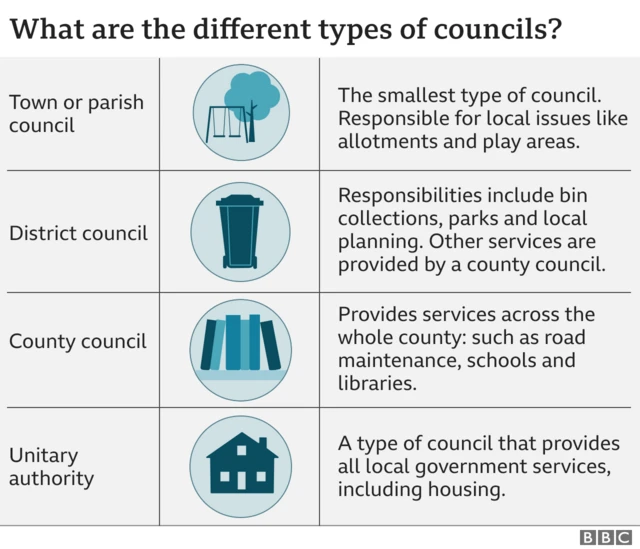Join our results coveragepublished at 21:25 BST 4 May 2023
 Nathan Williams
Nathan Williams
Live reporter
Polls will be closing soon, so we’re going to wrap up here.
I’m signing off but you can join my colleague Rob Corp as he kicks off our results live page here
This year's local elections are under way in England
Voters are deciding who runs services in 230 local councils - with around 8,000 councillors' seats and four local mayoral posts up for grabs
For the first time, voters will need to show photo ID in polling stations - passports, driving licences and some other forms of ID can be used
Local councils are responsible for many public services, including schools, care for elderly and disabled people, and fixing potholes in some roads
Polls are open until 22:00 tonight
The BBC, like other broadcasters, can't report details of campaigning or election issues while polls are open - instead expect plenty of traditional snaps of dogs at polling stations
Edited by Nathan Williams
 Nathan Williams
Nathan Williams
Live reporter
Polls will be closing soon, so we’re going to wrap up here.
I’m signing off but you can join my colleague Rob Corp as he kicks off our results live page here
It's all going to get rather exciting after the polls close at 2200 and the results start coming in. Here's how to follow.
Online: We'll have a live page bringing you all the latest results and analysis. There'll also be more coverage on our Politics pages too - plus we'll have full results pages for all areas with elections too.
TV: Our election results programme, hosted by Laura Kuenssberg, will kick off on BBC1 and the News Channel from 2340. You can also watch on iPlayer.
There'll be coverage throughout Friday, with BBC Breakfast from 0600, and then on the News Channel from 0900. Politics Live, presented by Jo Coburn, will be on BBC2 and the News Channel from 1200, then BBC 1 and the News Channel from 1345 to 1630.
Radio: Radio 4 and Radio 5 Live will be running election coverage from 2300. The Today programme will bring you results and analysis on Radio 4 from 0600 tomorrow - and to get the lowdown on what's happening in your area, you can find your local BBC radio station here.
It is not just about voting for councillors today - voters in Bedford, Leicester, Mansfield and Middlesbrough are also choosing their next mayor.
These mayors are the directly-elected leaders of their local authorities, and not to be confused with metro mayors, who have power across a wider region and are up for election later in the year.
The mayors being elected today are done so through the first past the post system.
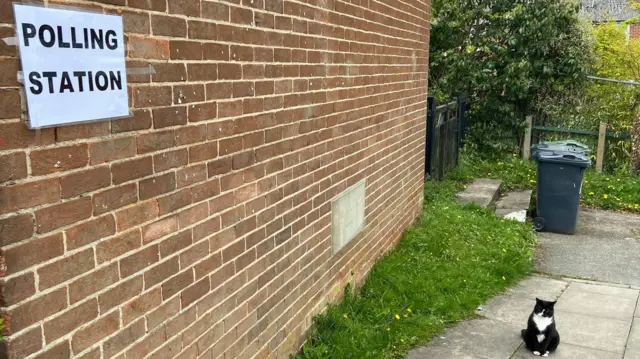 Image source, Nicole Pretorius/PA Wire
Image source, Nicole Pretorius/PA WireWe've seen a lot of lovely dogs outside polling stations today. However, we've spotted another pet interested in politics - this cat in north Leeds
Nicole Pretorius tweeted, external a photo of her eight-year old cat Bertie, with the hashtag #catsatpollingstations.
Hopefully Bertie didn't meet any dogs on his way.
You can:
You can't:
Planning to vote? There's still about two hours to go before the polls close - here's what you need to know:
Around England, thousands of voters have been turning out to decide who will represent them locally.
As is the tradition, the vote has been taking place in a whole range of venues that have been taken over for the day.
Here are some of our favourites.
 Image source, Reuters
Image source, ReutersDemocracy may be at work in the Brocket Arms pub in Ayot St Lawrence, but that doesn't mean the man delivering the kegs gets the day off
 Image source, Getty Images
Image source, Getty ImagesHopefully voters haven't been feeling all at sea as they cast their ballots at this polling station in Poole
 Image source, EPA
Image source, EPAThe political parties are hoping voters will join the dots when they walk into the polling booth at the Bank View Cafe in Sheffield
 Image source, Getty Images
Image source, Getty ImagesThis shipping container in Middlesbrough is one of the nation's smaller polling stations
 Image source, PA Media
Image source, PA MediaThe Bridlington Priory Church in Yorkshire is among the many religious buildings being redeployed for the day
 Image source, PA Media
Image source, PA MediaIf you are just in the door from work and sitting down to eat, don't worry - there are still a few hours left before the polls close in the local elections.
The vote is happening today in England only, and are deciding who runs services in 230 local councils.
There are around 8,000 councillor seats and four mayoral posts up for grabs - check if there's a vote in your area here.
For the first time, you’ll need to show photo ID to vote in polling stations. Passports and driving licences can be used - more details on accepted ID are here.
Polling stations are open until 22:00 tonight.
You can follow all the results and analysis during the night and throughout Friday on the BBC News website.
As we've been reporting, polls in England are open as voters in 230 councils will elect roughly 8,000 councillors and four local mayors.
Polling stations opened at 07:00 BST and they'll close at 22:00 tonight. All those eligible to vote need to show their photo ID at the polling stations.
But who is eligible to vote?
According to the UK government website,, external to vote in a local government election you must be:
Rules vary so voters should read their ballot paper carefully.
We're just hearing that the election in a council seat in Hampshire has been suspended because a candidate died after the polls opened.
Conservative councillor Graham Galton, running for election in the Coxford ward in Southampton, died on Thursday.
Residents have been told not to try to vote in the ward, with another election expected to take place within 35 days.
The council said in a statement: "The returning officer has been advised of the death of Coxford ward candidate Mr Graham Galton, who was standing for election to Southampton City Council in today's elections.
"Our condolences go to Mr Galton's family."
As voters head to the polls in England, here are some of the key words for today:
Ric Bailey
BBC chief adviser, politics

During the day while the polls are open, the BBC, along with the other Ofcom-regulated UK broadcasters, is restricted in what it can report.
The BBC is required by electoral law to adopt a code of practice, ensuring fairness between candidates, and that is particularly important on polling day.
The code of practice is contained in more detailed election guidelines which are written and published for each election, and they include guidance about polling day.
On polling day, the BBC does not report on any of the election campaigns from 00:30 BST until polls close at 22:00 BST on TV, radio or bbc.co.uk, or on social media and other channels.
However, online sites do not have to remove archived reports, including, for instance, programmes on iPlayer.
Any lists of candidates and the guide to parties' policies remain available online during polling day.
Not voted yet? If you have your polling card, it will give the location and address of the polling station you need to go to.
Lost your card? You don't need it to vote, but you do need to go the correct polling station.
You can use a tool on the BBC website to see where your polling station is. The Electoral Commission website , externalalso has a "Find your polling station" section, where you can type in your postcode and find out where to vote.
It also gives details for local electoral registration teams - which you can contact to check if you're registered.
Need a recap of what local elections are and how they work?
You're in luck - our reporter David Macmillan explains how it all works in under a minute below:
Local Elections 2023 explained... in Lego
For the first time in England, voters will need to show their photo ID to vote in person. The rule extends to police and crime commissioner elections, and parliamentary by-elections.
If you're heading to the polls there are 22 forms of valid ID you can use. These include:
The full list of acceptable ID is available on the government website here, external
You can use out-of-date ID as long as you look the same. You do not need to bring your poll card.
Some polling stations may have "greeters" outside to remind people to have their IDs out, but you only need to show your ID to staff issuing ballot papers inside.
Those without the right ID were encouraged to sign up for a free Voter Authority Certificate, external.
From October onwards, the ID requirements will apply to future general elections.
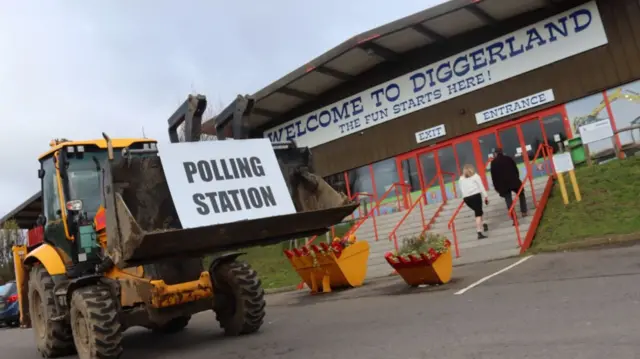 Image source, Diggerland
Image source, DiggerlandOne of the more unusual polling stations at Diggerland in Kent
OK, quiz time. How much do you know about the local elections?
Here are a few questions to test your knowledge. (Alas, there are no prizes for correct answers.)
Questions:
1) What do you need to take with you to vote?
2) How many council seats are up for grabs?
3) What do local councils do?
4) Which nations have an election today?
5) Is there a vote where you live?
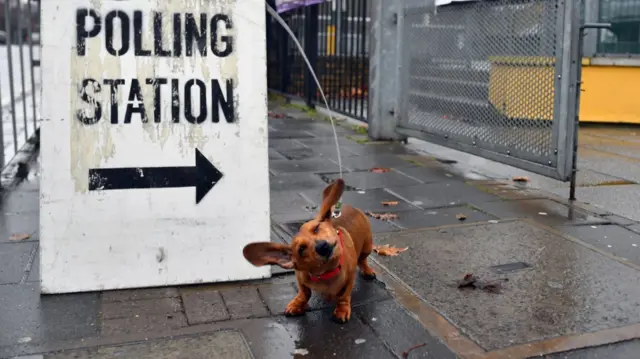 Image source, Reuters
Image source, ReutersAnswers:
1) New rules mean you'll need to show photo ID at the polling station. You don't need to bring your poll card though.
2) In England, 230 councils will be electing about 8,000 councillors and four local mayors.
3) Local councils are responsible for many public services, including: providing care for the elderly and disabled, schools, fixing potholes on some roads, collecting rubbish.
4) There are elections in England today. In Northern Ireland, 11 council elections are being held on 18 May.
5) You can use our handy election tool to see if there's a vote where you live. You've got until 22:00 tonight until polls close.
You can:
You can't:
It's not just voters turning up to the polls in England today, #DogsAtPollingStations are keeping us entertained. And at least one of them has her own ID...
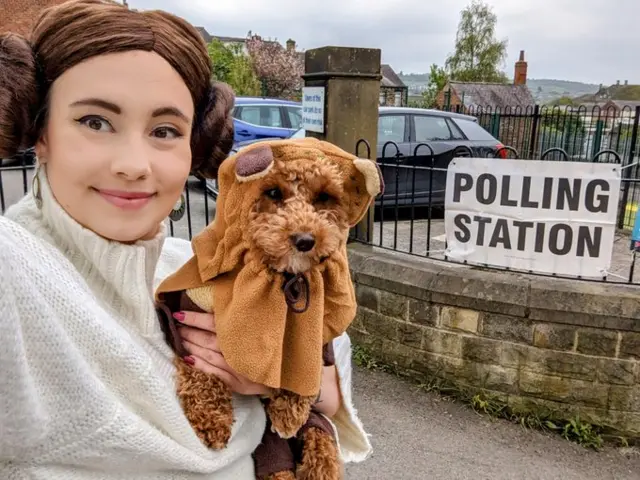 Image source, Kirklees Council
Image source, Kirklees CouncilOne member of staff at Kirklees Council chose a Star Wars theme for polling day, which falls on May 4th
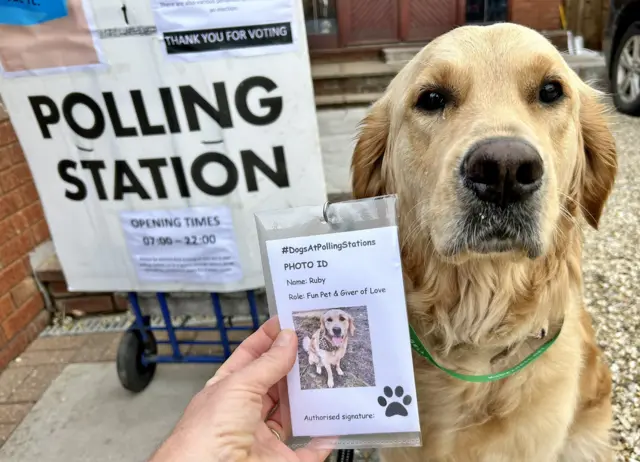 Image source, Annette Hill/PA
Image source, Annette Hill/PARuby turned up to the polling station with her very own photo ID
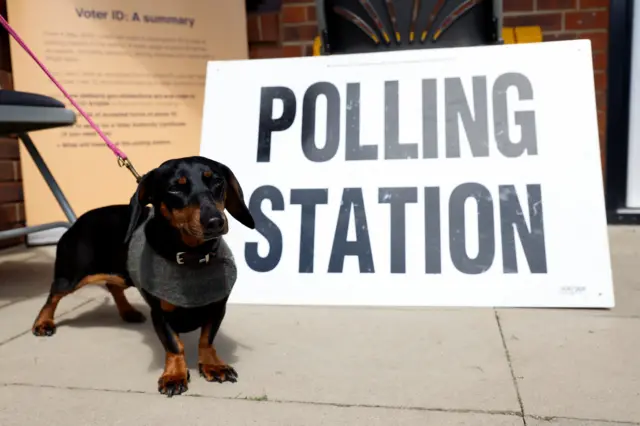 Image source, Reuters
Image source, ReutersElsie, a dachshund, looks smart siting by a sign at the Greenwood Park Community centre in St Albans
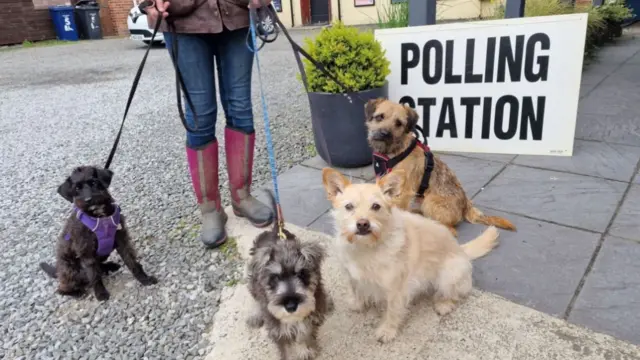 Image source, Joseph Whitfield
Image source, Joseph WhitfieldPolly, Arthur, Buttons and Billy with their owner in Cleadon, South Tyneside
If you're just joining us, welcome. Our coverage today is focused on local elections in England, where more than 8,000 seats are being contested at 230 councils.
Voters in Bedford, Leicester, Mansfield and Middlesbrough are also choosing their next mayor. Polls will close at 22:00 tonight.
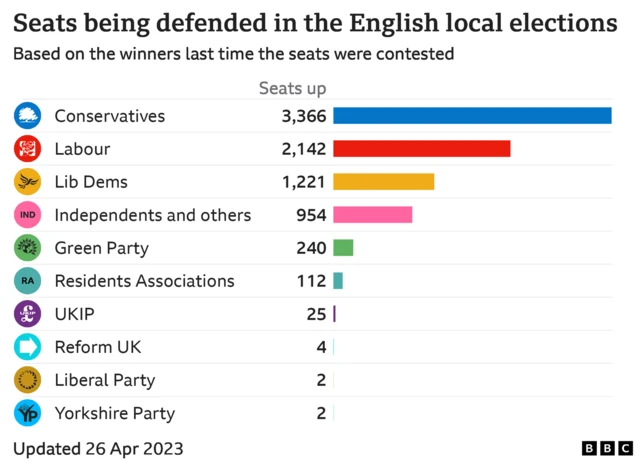 Image source, .
Image source, .Results from more than 60 councils are expected overnight, but we expect to find out about the rest throughout the day tomorrow.
For the first time in England, people will need to show their photo ID at polling stations.
If you're on your way to the polls, passports, driving licences and Older or Disabled Person's bus passes are some of the 22 acceptable forms of ID.
Voters in Northern Ireland will head to the polls in two weeks - on 18 May - where 11 council elections will be held.
Local councils are responsible for many public services, including:
In Northern Ireland, which has elections on 18 May, councils have fewer responsibilities. They do not run education, road-building or housing, but do collect taxes and maintain some local services.
